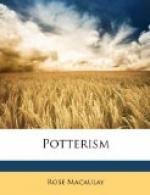But Arthur Gideon is full of twists and turns and surprises. He is one of those rare people who can really throw their whole selves into a cause—lose themselves for it and not care. (Jukie says that’s Christian: I dare say it is: it is certainly seldom enough found in the world, and that seems to be an essential quality of all the so-called Christian virtues, as far as one can see.)
Anyhow, Arthur’s passion for truth, his passion for the first-rate, and his distaste for untruth and for the second-rate, seemed to be the supreme motive forces in him, all the years I have known him, until just lately.
And then something else came in, apparently stronger than these forces.
Of course, I knew a long time ago—certainly since he left the army—that he was in love with Jane. I knew it long before he did. It was a queer feeling, for it went on, apparently, side by side with impatience and scorn of her. And it grew and grew. Jane’s marriage made it worse. She worked for him, and they met constantly. And at last it got so that we all saw it.
And all the time he didn’t like her, because she was second-rate and commercial, and he was first-rate and an artist—an artist in the sense that he loved things for what they were, not for what he could get out of them. Jane was always thinking, ’How can I use this? What can I get out of it?’ She thought it about the war. So did Johnny. She has always thought it, about everything. It isn’t in her not to. And Arthur knew it, but didn’t care; anyhow he loved her all the same. It was as if his reason and judgment were bowled over by her charm and couldn’t help him.
2
The evening after Oliver Hobart’s death, Arthur came in to see me, about nine o’clock. He looked extraordinarily ill and strained, and was even more restless and jerky than usual. He looked as if he hadn’t slept at all.
I was testing some calculations, and he sat on the sofa and smoked. When I had finished, he said, ‘Katherine, what’s your view of this business?’
Of course, I knew he meant Oliver Hobart’s death, and how it would affect Jane. One says exactly what one thinks, to Arthur. So I said, ’It’s a good thing, ultimately, for Jane. They didn’t suit. I’m clear it’s a good thing in the end. Aren’t you?’
He made a sharp movement, and pushed back his hair from his forehead.
‘I? I’m clear of nothing.’
He added, after a moment, ’Is that the way she looks at it, do you suppose?’
‘I do,’ I said.
He half winced.
‘Then why—why the devil did she marry the poor chap?’
There was an odd sort of appeal in his voice; appeal against the cruelty of fate, perhaps, or the perverseness of Jane.
I told him what I thought, as clearly as I could.




